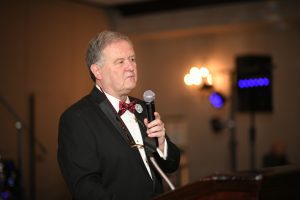Parking pandemonium: Tensions swell as parking season takes off in Port Jeff

The managed parking system in the Village of Port Jefferson has undergone considerable changes this season, prompting debate among some within the community.
Beginning March 15, the village government has incorporated various technologies into its managed parking apparatus, such as automated license plate reading, which village officials say expedites and standardizes parking enforcement.
“We’re looking to make sure that enforcement is more equitable, that there’s less room for a mistake or discretion,” Mayor Margot Garant said in an exclusive interview. “The license plate reader is in at least one of the code vehicles, and when it drives through the parking lot, it scans everything very quickly.” She added, “I think it’s going to be a much more blanketed, equitable process and easier for all parties.”
Kevin Wood, the village’s parking administrator, outlined how the new tech would operate. He said pay-by-plate metering allows for more efficient enforcement of overtime parking and eliminates the need for double payment caused by temporarily leaving and losing a parking space, among other potential benefits.
Wood said digital payment also simplifies parking during future visits as the system remembers one’s plate number. “The next time you come back into town, your plate number is already filled in,” he said. “You can’t say that about a space number because you park in a different space every time.”
The village has also digitized its residential permitting process, supplanting the previous method which was performed by hand. So far, Wood said his office has received nearly 2,000 permits.
Responsiveness questions
The changes to parking procedure have met some opposition, particularly from the business community. James Luciano, owner of PJ Lobster House, has been among the opponents to the changes.
In an interview, Luciano indicated that many of his older customers prefer the preexisting method of paying at a meter.
The new system “is a hassle for the older clientele,” he said, suggesting older customers often make multiple trips to and from their cars to pay for parking.
“I know it doesn’t seem like a lot, but when you have clientele that are in their 60s, 70s and 80s, it is a lot for them to do that,” he added.
He said he receives daily complaints over digital payment, estimating complications using the system “probably happen 25 times a day — it’s a big problem that people are complaining about.”
Luciano attributes much of the village’s parking adversity to a lack of responsiveness from the village government, suggesting his recommendations to the village have fallen on deaf ears.
“We’ve sat down in meetings, we’ve sent letters over the last two years,” he said. “They say, ‘Thank you for the input,’ and then they do what they want. They don’t want to take any recommendations from anybody.”
Wood suggested his office is actively coordinating with the business community and that no significant changes have been made to the system other than entering a plate number instead of a space number.
“There are no changes to navigate,” Wood said. “The parker himself only enters a plate number instead of a space number, and that’s self-evident. But that being said, my office is always available to answer questions on a one-by-one basis and/or my assistant, Rita.”
Garant said her administration remains committed to working with merchants over any concerns with the system. Nonetheless, she expressed confidence that the new system would prevail over time.
“There are some recommendations that they have and questions, and we’re answering them as we can,” the mayor said. “Obviously, with anything, you’re going to get mixed concerns. I think once everybody settles into this new system, they’ll find that it’s an easier system to use.”
Capacity: an age-old problem‘The number one challenge is capacity. It accounts for just about everything we are challenged with.’
— Kevin Wood
Parking is a decades-old quandary in Port Jeff, confounding generations of local officials who have struggled to solve the parking puzzle.
Richard Murdocco, adjunct professor in the Department of Political Science at Stony Brook University, summarized the issue in a word.
“Capacity — hands down, capacity,” he said. “It’s what all the villages on Long Island struggle with. How do you shoehorn in more parking without compromising the very character that people are seeking out?”
Wood concurred with this assessment. “The number one challenge is capacity,” he said. “It accounts for just about everything we are challenged with.”
Former village trustee Bruce Miller regarded the capacity constraints as all-pervasive, compounding other problems, such as traffic congestion. “It creates a lot of traffic that’s needless,” he said. “People are circling and circling and circling to find a parking place.”
Former New York State Assemblyman Steve Englebright (D-Setauket) commented on the generations of anguished parkers pressed to find a space. He regarded Port Jefferson as distinctive for its blend of bustling downtown activity and limited capacity.
“The oversubscription of use is inevitable for a place that is as attractive, and that faces the water, which is such a magnet for this whole sector of the Island,” he said. “You want to go to Port Jefferson because there are businesses, and a vibrant walk along the harbor is exciting.”
But, he added, “It means you’re always going to have a traffic jam.”
Meanwhile, the Town of Brookhaven, which operates the marina parking lot near the ferry terminal, has set its 2023 parking rates at five times the rate of Port Jefferson’s managed lots. Wood said this could further strain the village’s already cramped lots.
“My common sense tells me that if something is $5 an hour, and they can get that same service for $1 an hour, that tells me they’re going to put more pressure on us,” he said.
Possible solutions
Murdocco said a natural tension exists between preserving the historic character of an area and expanding parking capacity. He added, however, that the capacity issue would eventually cap the village’s growth potential for its residential and commercial districts.‘Policymakers should begin exploring some more modern, viable options.’
— Richard Murdocco
“Policymakers should begin exploring some more modern, viable options,” the SBU adjunct professor said. The most obvious option, he indicated, would be to construct a parking garage.
This proposal would come with its own set of challenges, according to Englebright. “I don’t think there’s an easy answer to this because even if you add a parking garage, I think it will be oversubscribed on the first day,” he said.
Wood noted that he gives “daily thought” to this idea, which is also proposed in the village’s 2030 Comprehensive Plan. However, given the natural topography and existing built environment, the municipality remains hamstrung in specific ways.
“Now is the time where I think we would have a serious look at building multidecks [above-ground parking garages], but it’s not so easy because of the landscape of Port Jeff, the depth of the water and things like that,” he said.
Asked whether he foresees the village accommodating a garage in the coming decades, the parking administrator responded affirmatively.
“I’d like to hope that we can come to the point where that possibility could happen,” he said, adding, “If it were in the best interest of the community and residents, I’d like to think we could come to an agreement on that.”
Miller advised the village government to explore underground parking, an option he said would boost capacity without disrupting the area’s historic character.
“A lot of the residents and public do not want an above-ground parking garage — we’re not rural here, but we just don’t see ourselves as urban,” he said. “The advantage of underground parking is that it doesn’t make your town look urban. You don’t have underground structures protruding from the ground.”
Another alternative the village is actively seeking is shared parking, that is, entering into agreements with nearby businesses to facilitate access to their lots during nonbusiness hours.
Wood said he and trustee Rebecca Kassay are working to enter into shared-use parking agreements, particularly with hospitals and medical offices in Upper Port.
“There’s not a lot of commercial activity happening uptown, but that will change,” Wood said, adding that shared parking would offer “immediate parking to people frequenting uptown.”
Kassay, who also serves as the village’s environmental commissioner, said the shared parking proposal would help minimize the need for building new parking lots uptown, as well as the clearings and heightened flooding characteristic of such construction.
Shared parking “would prevent more square footage uptown from being hardscaped, which is a contributor to the flooding because water is not being collected, recharged and filtered in the way it naturally would,” she said.
The trustee added, “The issue of parking is very real, but the creative solutions, like shared parking, are a way that we as a village can solve parking issues, be environmentally conscious and save taxpayers money by not building and maintaining additional lots.”
Parking committee
Garant, who had coordinated with a parking committee composed of residents and merchants earlier in her tenure, recounted the history and role of that body.
“We had a committee for upward of eight or nine years,” she said. “I think that they brought great concerns, and we heard from them.”
Asked whether the village should reinstitute the parking committee, she responded, “I’m on my way out, so I’ll leave that to the next administration,” adding, “I think Kevin is doing a great job, so I’m going to let the next elected mayor make those decisions going forward.”
Wood emphasized that a committee would not resolve the core issue permeating all parking woes villagewide. “The one thing we all end up talking about is the lack of capacity,” the parking administrator said. “All the committees in the world won’t fix the immediate need for more capacity.”
He added, “We get feedback all the time. We take it under advisement. But again, it usually leads back, after everything is said and done, to lack of capacity.”
Wood, instead, encouraged concerned parties to take their concerns to the village board. For him, public comments during village board meetings provide community members the proper forum to be heard.‘It would seem to me that some democratization would be logical.’
— Steve Englebright
Public comment “is the best way to communicate what you are trying to say about any subject,” Wood said.
Luciano, on the other hand, advocated for the reinstatement of the parking committee as a means to properly filter concerns from the greater community.
“The parking committee needs to exist, and the village needs to take the recommendations from the parking committee,” he said.
Detailing why he believed the committee had disbanded, Luciano again suggested a lack of responsiveness from the village. “They got rid of it because they didn’t want to hear input anymore and because they were going to do what they wanted to do.”
Ana Hozyainova, president of the Port Jefferson Civic Association, has joined the call for resurrecting the parking committee. In an email statement, she said a parking committee would reintroduce debate to the parking decision-making process.
“The Port Jeff Civic Association fully supports the reestablishment of a parking committee composed of representatives from all stakeholders,” she said. “Reinstituting the parking committee would provide a transparent forum for discussion and decision-making.”
The civic president added, “It would also help ensure that we face our parking challenges in a manner that addresses the needs and concerns of all our residents and still preserves the character and appearance of our beautiful village.”
Englebright regarded the proposal for a parking committee as necessary for promoting public participation.
“If you live in the village, there has to be some sense of being able to participate,” he said. “There needs to be some reasonable balance between the commercialism that dominates parts of the downtown and the needs of the residents, which should not take second place.”
He added, “I don’t know how you do that without some sort of forum other than the regular meetings of the village board. It would seem to me that some democratization would be logical.”

























